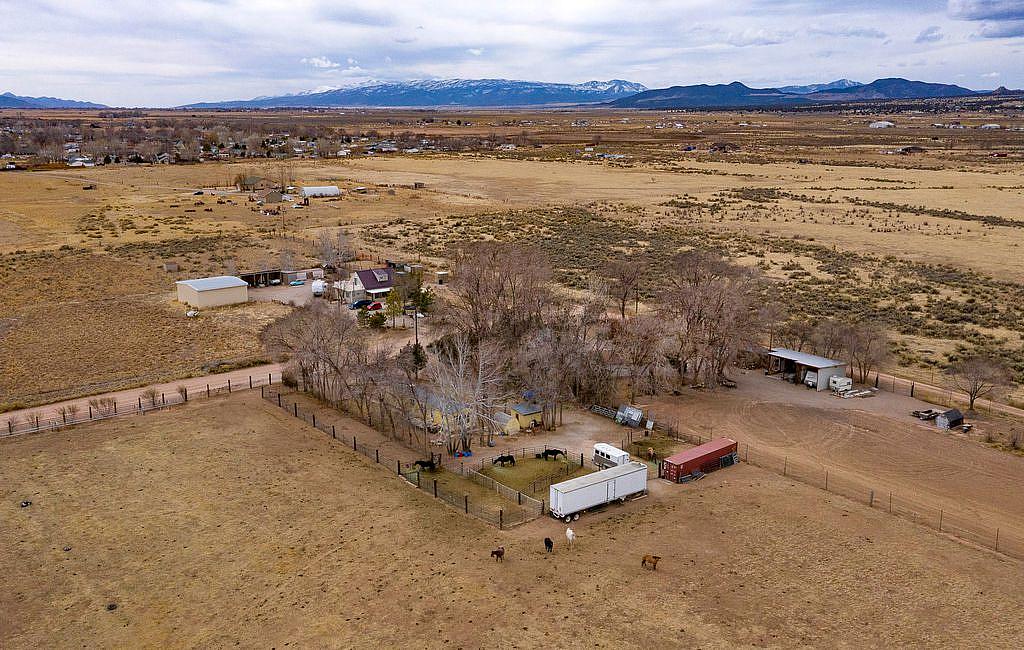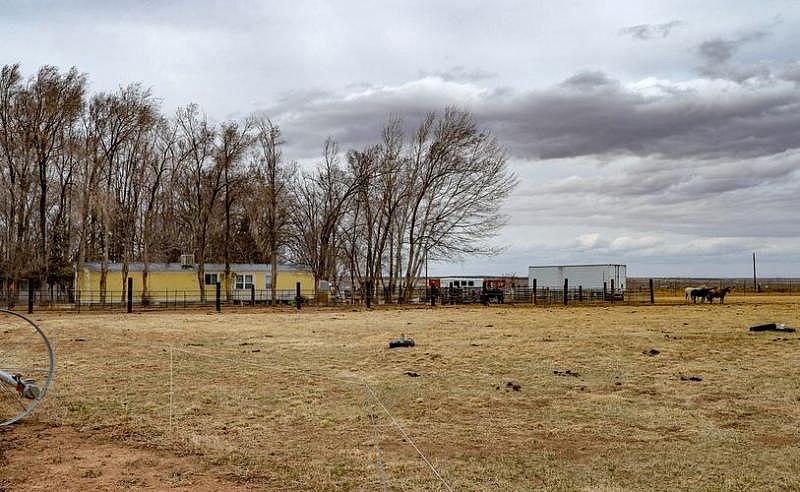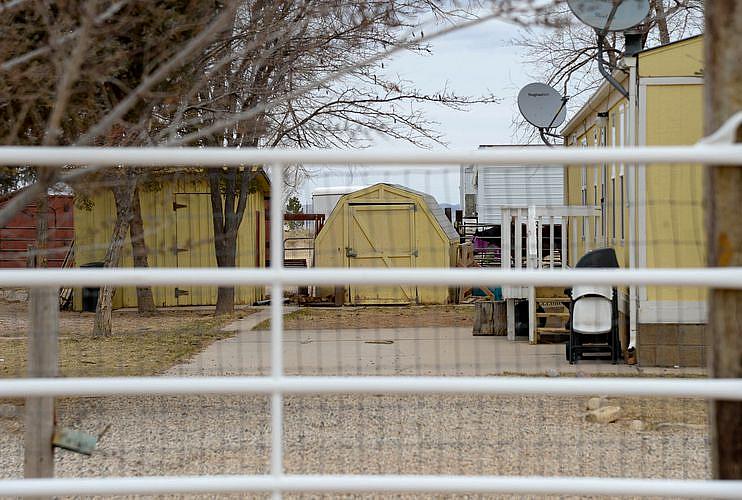A girl, her hands zip tied, was forced to sit in a horse trough at a Utah ‘troubled-teen’ center
This story was produced as part of a larger project by Jessica Miller, a participant in the 2019 Data Fellowship. Her project focuses on the troubled rehabilitation industry in Utah, where youth residential treatment centers are abundant but lack oversight.
Also in this series:
Paris Hilton says she was abused while at Utah facility for ‘troubled teens’
Part 2: Provo Canyon School’s history of abuse accusations spans decades, far beyond Paris Hilton
Paris Hilton creates petition to shut down Provo Canyon School
Paris Hilton leads rally against Provo Canyon School
Why we raised money to get reports on Utah’s ‘troubled teen’ treatment centers
Part 3: Utah faces criticism for its light oversight of ‘troubled teen’ treatment centers
Part 4: Former students at Utah troubled-teen centers say their reports of sex abuse were ignored
Utah inspectors find no problems in ‘troubled-teen’ facilities 98% of the time
Increased oversight is coming to Utah’s ‘troubled-teen’ industry
Utah officials want your help as they draft new rules for the ‘troubled-teen’ industry

Havenwood Academy, a youth treatment center on the outskirts of Cedar City, was investigated for zip tying a girl's wrists and forcing her to sit in a horse trough full of water in 2018. Utah regulators didn't sanction the program.
(Francisco Kjolseth | The Salt Lake Tribune)
It started as a routine police call. In June 2018, a 17-year-old girl living at a treatment center for troubled teens had hit a staff member in the face during a therapy session involving horses. But when deputies arrived at the small ranch in southwest Utah, staff said the suspect was waiting “in the trough.”
Confused, the deputies walked back to the corral. There they found a girl sitting in a tub of dirty water up to her torso. When the girl stood, they saw her hands were zip tied behind her back.
One deputy yelled for a staffer to get her out of the water, according to the police report. Another cut her loose.
The girl told deputies she had tried to run away from Havenwood Academy, a 16-bed treatment center located a few miles from the horse property. When a staffer had tried to stop her, she had thrown a punch, she told them.
By the time the deputies arrived, she had been in zip ties for about 30 minutes, she told them, and in the horse trough for about 20.
“I could observe red restraint marks on both wrists,” Deputy Mike Hilleger wrote in a police report. “[The girl’s] body was cold to the touch and had visible goosebumps on her arms. Her clothes were soaked through with the dirty horse trough water as well.”
The discovery led to investigations from law enforcement, child welfare workers and Utah’s Office of Licensing, the regulatory body that oversees youth treatment centers. They found that this wasn’t the act of a rogue employee. The facility had used the horse trough as a form of “therapeutic discipline,” for three years, according to state records.
But at the end of those investigations, there were no penalties for Havenwood Academy. No staff member has faced criminal charges. Its license remains in good standing, as does the social work license of the clinical director, Linda Reeves, who was aware of the practice, according to Office of Licensing records. And the equine director who pioneered putting girls in troughs remained in her position until she quit this month.
It is unclear if the girl ever faced charges for assault, though she never returned to the program.
The episode is emblematic of Utah’s approach to regulating the youth treatment industry. Facilities caught mistreating children often receive little more than a mild scolding, state records show. Even when outlining how Havenwood violated state rules by using the horse trough, regulators made it clear in a letter that their action was “not a penalty.”
Public documents reveal how the state handled the whole affair discreetly. Regulators sent a letter demanding the facility stop placing girls in troughs, and its owner — a prominent lawyer in southern Utah named Blaine Hofeling — agreed to end the practice, though he denied in his response to the state that it was abusive, humiliating, or even a form of punishment.
Several former residents who saw girls placed in the trough said it was clearly a punishment and a degrading one at that.
(Francisco Kjolseth | The Salt Lake Tribune) Havenwood Academy, a youth treatment center on the outskirts of Cedar City, was investigated for zip tying a girl's wrists and forcing her to sit in a horse trough full of water in 2018. Utah regulators didn't sanction the program.
Documents outlining Havenwood’s use of horse troughs are included in a new database released by The Salt Lake Tribune, KUER and APM Reports that provides the public with unprecedented access to reports on violations at Utah’s troubled-teen treatment centers. The news organizations are collaborating on an investigation into the residential treatment industry, which has faced repeated accusations of child abuse and neglect.
Those allegations led state lawmakers to recently pass legislation that aims to toughen the state’s regulation of facilities like Havenwood, including restricting the use of “mechanical restraints,” like zip ties. The legislation, championed by activists that included celebrity Paris Hilton, faced little opposition.
That is until the bill reached the House and faced its final vote.
Rep. Rex Shipp, R-Cedar City, pushed an amendment that would have allowed residential treatment staff members to inflict pain on children if it would help keep them from hurting themselves or someone else. He said he drafted his amendment after talking with Nathan Hofeling, Blaine Hofeling’s son and Havenwood’s chief operating officer.
“This just enables them to inflict a little bit of pain to get the person under compliance,” Shipp said during the debate. “Typically a bent wrist. I don’t know if you’ve ever had somebody bend your wrist. It can create some pretty good pain to get the compliance.”
The House rejected Shipp’s addition and passed the reform bill. Gov. Spencer Cox signed the bill into law on Monday.
Ken Huey, Havenwood’s executive director, said their administrators had talked with Shipp because they worried if staffers were banned from bending wrists or other painful measures, they couldn’t stop a girl who was hurting herself or someone else.
“We were in discussion to say, ‘Look, if not in times of real emergency, if there’s not opportunity for painful restraint, what do you want us to do?’” he said. “We continue to ask that question.”
A form of discipline
Huey has been Havenwood’s executive director for just six months, so he wasn’t there when horse troughs were used as “therapeutic discipline.” Still, he answered questions on behalf of the company.
Zip ties were used only that one time, he said, but it is his understanding that the equine director would tell girls to get into the trough if they were “acting out.” Huey said the water was clean — though the police report says otherwise — and wasn’t used by the horses.
“They’d laugh and jump in the horse trough and cool down,” he said. “It became, as I understand it, just kind of a game.”
But several girls who were there at the time considered the trough an unpleasant and distasteful form of discipline.
“They tried to make it seem like a fun punishment,” said Tori Green, whose parents sent her to Havenwood in 2015. “Who wants to sit in a dirty, cold water trough?”
(Francisco Kjolseth | The Salt Lake Tribune) Havenwood Academy, a youth treatment center on the outskirts of Cedar City, was investigated for zip tying a girl's wrists and forcing her to sit in a horse trough full of water in 2018. Utah regulators didn't sanction the program.
Destiny Gebhart, who was there in 2017, said she once saw a girl ordered into the trough when the water was so cold a staffer had to break away a skin of ice before she got in.
Destiny’s mother, Natalie, said she was told about the trough when she dropped her daughter off.
“It was kind of like a ha-ha sort of thing,” the mother said. “I just thought it would be something kind of silly.” She said she didn’t realize that it was actually a form of discipline.
After Destiny left Havenwood, her mother filed a complaint against the facility with the Better Business Bureau, alleging that its services didn’t live up to the claims on its website. An arbitrator with the bureau found in her favor and ordered Havenwood to remove some statements. The organization chose not renew its accreditation with the bureau two months later, according to Britta Clark, communications director for BBB’s Utah branch.
Many of the children who attend Havenwood Academy and facilities like it have experienced trauma during their formative years. And experts say the staff need to be careful not to compound that trauma.
“It clearly was humiliation,” said Joe Ryan, a professor of social work at the University of Michigan, who reviewed the state and law enforcement reports on Havenwood’s trough discipline. “If that’s not humiliating public shaming, I don’t know what is.”
Ryan said that if a facility in Michigan disciplined children in such a manner, the state would likely shut it down.
“That would be a disqualifying event,” he said. “You just have to wonder who’s in charge of this operation? And why are they still in charge of this operation?”
Blaine Hofeling is the CEO of The Hope Group, which runs three programs: Havenwood, Zion Hills Academy and a yet-to-be-opened facility called Eagle’s Rest Ranch. Hope Group has offices in a building that Shipp owns.
Huey said their clients are most often youth who have been through “significant trauma,” and their stays are paid for through Medicaid or adoption assistance programs.
(Francisco Kjolseth | The Salt Lake Tribune) Havenwood Academy is part of The Hope Group, which owns three youth residential treatment centers in Utah.
Trough discipline
Five former residents interviewed for this story said the trough was the favored punishment of Havenwood’s equine director, LoraLynn Jones.
“LoraLynn, that was her thing,” said Ryleigh Addabbo, who left Havenwood in 2016. “If you cuss, if you interrupt, if you are disrespectful, you sit in the horse trough. If you try to get out of the horse trough, she will zip tie your hands and you will sit in the horse trough the entire time that you are in therapy.”
Addabbo said she never saw the zip ties used, only threatened.
Of the former residents interviewed, the only one who defended the trough was Daniel Howarth, a transgender man who worked at Havenwood for several months after he graduated from the program at age 18.
“For me, it seemed more than fair,” Howarth said. “We discussed the consequences. You broke the rules; you’re going to get the consequence.”
Howarth was involved in the 2018 trough incident that sparked the licensing and law enforcement investigations and said he helped restrain the girl who tried to run away.
As Howarth understands it, Jones got the idea for trough discipline because her own father forced her to sit in one to “cool down” when she got upset as a child.
The inspiration is also referenced in the police report.
“Her dad picked her up and tossed her in the water trough filled with moss and bugs,” a deputy wrote. “He told her to sit there and think about her attitude. She said the lesson she learned on that day was the way she was talking to her dad was ‘poopy’ like the water. … She said the experience was symbolic.”
Despite the violations noted by the state in 2018, Jones continued as Havenwood’s equine director until this month. While Huey said Jones stepped down voluntarily, Havenwood hopes to continue working with her on a more limited basis.
Her departure came roughly around the time that The Tribune, KUER and APM Reports released its database, which includes the state’s letter about the trough incident. Child advocates quickly found it and began circulating that letter on social media.
When contacted through a text message, Jones referred a reporter to Huey for comment. Reeves, the clinical director who told state investigators she was aware of the trough-based discipline for three years, also declined to comment. Her clinical social worker license remains in good standing in Utah.
Huey said that after that incident Havenwood changed its practices and the employees involved were disciplined. Most left their jobs shortly after, including Howarth, even as Jones stayed on.
Huey called her “a wonderful lady who made a mistake.”
“Zip tying them and putting them in a horse trough, it’s outside the normal protocols for sure,” he said. “It’s just not good care. It’s a mistake.”
A new law
When state regulators find out that a facility has broken Utah rules, there are a few actions they can take. They can create a written notification, or they can ask for a “corrective action plan,” where a facility owner writes down what they’ll change to be in compliance. That’s what happened with Havenwood.
The only action considered to be a penalty is a “notice of agency action,” in which the Office of Licensing requires a fix within a certain time frame or the program will lose its license.
Amanda Slater wasn’t in charge of the Office of Licensing three years ago. She said she couldn’t speculate why licensing officials didn’t take stronger action against Havenwood, but added the “corrective action plan” process has been strengthened since then and now includes a required follow-up within three months.
“When I read that corrective action plan in that instance, it was as horrifying to me as it was probably to you,” she told a reporter.
Slater said the new law provides more clarity.
“The new Senate bill is very clear about what’s acceptable and what’s not acceptable practices,” she said. “And we would enforce based on that.”
That legislation, sponsored by Sen. Mike McKell, R-Spanish Fork, requires treatment centers to document any instance in which employees use physical restraints or place a child in seclusion. It prohibits programs from sedating residents or using mechanical restraints, like zip ties or a straitjacket, without the state’s prior authorization. It boosts the number of annual inspections to four.
It also prohibits facilities from inducing pain, like hyperextending joints, to gain compliance. That’s the part that Havenwood had a problem with.
Huey, the executive director, gave an example of a girl starting to hurt herself with something sharp. He said bending her wrist could stop her.
“A bent wrist they’ll recover from in five minutes,” he said. “We don’t want to use them. There’s very few people even trained that are allowed to do that. I’m actually cool with never using a bent wrist control. I hate them. I don’t like them at all. If I have some other way to keep that kid safe, I’m in. Just tell me what it is.”
Huey said that’s a gap he had hoped to see closed by Shipp’s amendment.
But Utah representatives weren’t keen on the idea — with some lawmakers pointing out that it was a slippery slope if pain-inducing restraints were allowed.
“It’s so easy to always say it was necessary for their own safety,” said. Rep. Ray Ward, R-Bountiful. “It’s just so easy to cross over that line.”
With the amendment defeated, Huey said Havenwood is planning to start turning away girls who might be more challenging. He said they recently said no to a girl because they worried they might not be able to control her.
He said the girl will likely be headed to a juvenile lock-up instead.
“There is a chance she’ll come and not be as intense as she is on paper. But we can’t take that chance,” he said. “We are not going to get in a place where we’re sideways with the state.”
Since the horse trough incident in 2018, Havenwood has had several “critical incidents” reported to regulators. Officials from another state complained in 2019 that girls were frequently running away from Havenwood — which like most Utah treatment programs, accepts residents from across the country. Later that year, the facility reported a staff member punched a girl in the face “in self-defense.” And last February, they reported to licensors that a girl was injured after she fell off a balcony.
These incidents are included in the new database available at sltrib.com/teentreatment.
Listen to the KUER report.
This story is part of Sent Away, an investigative reporting partnership between The Salt Lake Tribune, KUER and APM Reports, with support from the Corporation for Public Broadcasting.
[This story was originally published by The Salt Lake Tribune and APMreports].

